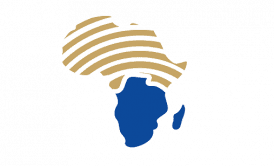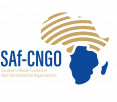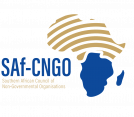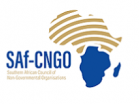
Introduction and background
The Southern African Council of Non-Governmental Organisations (SAf-CNGO), formerly the Southern African Development Community of Non-Governmental Organisations (SADC-CNGO), is a regional umbrella body of national associations of NGOs operating in all the 16 Member States of the Southern Africa Development Community (SADC). SAf-CNGO was formed in 1998 in Gaborone, Botswana with the aim of facilitating effective and meaningful engagement between civil society in the region and SADC institutions at both national and regional levels.

SADC Institutions
SAf-CNGO strives to enhance civil society participation in the activities and priorities of the following SADC institutions:
Last Summer Price Meltdown. Get discounts up to:
25%
OFF
TEES, SHORTS & SWIMWEAR FOR EVERYONE.
Use the voucher code.
WXBHUF25%OFF

Summit of Heads or State or Government
The SADC Summit is responsible for the overall policy direction and control of functions of the community, ultimately making it the policy-making institution of SADC. It is made up of all SADC Heads of States or Government and is managed on a Troika system that comprises of the current SADC Summit Chairperson, the incoming Chairperson (the Deputy Chairperson at the time), and the immediate previous Chairperson.
The Troika System vests authority in this group to take quick decisions on behalf of SADC that are ordinarily taken at policy meetings scheduled at regular intervals, as well as providing policy direction to SADC Institutions in between regular SADC Summits. This system has been effective since it was established by the Summit at its annual meeting in Maputo, Mozambique, in August 1999. Other member States may be co-opted into the Troika as and when necessary.
The Troika system operates at the level of the Summit, the Organ on Politics, Defence and Security, the Council of Ministers and the Standing Committee of Senior Officials. Application of two Troikas at the level of the Standing Committee of Senior Officials, which comprises Permanent, or Principal Secretaries or accounting for government offices, ministries or departments and at the level of the Organ on Politics, Defence and Security Cooperation is referred to as the Double Troika.
The Summit usually meets once a year around August/September in a member State at which a new Chairperson and Deputy are elected.
Summit of Heads of State or Government

Organ on Politics, Defence and Security Cooperation
The SADC Organ on Politics Defence and Security is managed on a Troika basis and is responsible for promoting peace and security in the SADC region. It is mandated to steer and provide Member states with direction regarding matters that threaten peace, security and stability in the region. It is coordinated at the level of Summit, consisting of a Chairperson, Incoming Chairperson and Outgoing Chairperson, and reports to the SADC Summit Chairperson.
The SADC Summit and Organ Troika Summit are mutually exclusive; and, the Chairperson of the Organ does not simultaneously hold the Chair of the Summit. The Organ structure, operations and functions are regulated by the Protocol on Politics, Defence and Security Cooperation. Like the Summit chair, the Organ chair rotates on an annual basis.
Organ on Politics, Defence and Security Cooperation

Council of Ministers
The Council of Ministers oversees the functioning and development of the Southern African Development Community (SADC) and ensures that policies are properly implemented. The Council consists of Ministers from each Member State, usually from the Ministries of Foreign Affairs, Economic Planning, or Finance. It meets twice a year in January or February and immediately prior to the Summit in August or September.
Council of Ministers

SADC Secretariat
The Southern African Development Community (SADC) Secretariat is the principal executive institution of SADC, responsible for strategic planning, co-ordination and management of SADC programmes. It is also responsible for the implementation of decisions of SADC policy and institutions such as the Summit, the Troikas and Council of Ministers. It is headed by an Executive Secretary and has its headquarters in Gaborone, Botswana. The Secretariat is guided by Institutional Vision and Mission. The structure of the Secretariat as approved on 28 February, 2008 in Lusaka, Zambia comprises the following:
Executive Secretary
Organ on Politics, Defence and Security
Internal Audit & Risk Management
Communication & Public Relations
Gender
Macro-Economic Surveillance
Deputy Executive Secretary: Regional Integration
Trade, Industry, Finance and Investment
Infrastructure and Services
Food, Agriculture and Natural Resources
Social and Human Development and Special Programmes
Policy Planning and Resource Mobilisation
Deputy Executive Secretary: Corporate Affairs
Budget and Finance
Human Resources and Administration
Conference Services
Procurement
Legal Affairs
Information and Communication Technology
The Secretariat

The Tribunal
Establishment and jurisdiction
SADC Administrative Tribunal (SADCAT) was established by a Resolution of the SADC Summit meeting held in Gaborone, Republic of Botswana, on 18 August 2015 pursuant to Article 9(2) and 10(6) of the SADC Treaty. SADCAT has jurisdiction to hear and determine labour disputes between SADC Secretariat or any of its institutions, as an employer, and an employee. This includes a dispute relating to the contract of employment of a staff or to the terms of appointment of such staff member. The Tribunal is headed by an elected Judge-President and Vice-President who are assisted by a Secretariat.
Applicable Laws
In deciding any application or appeal, SADCAT shall apply the internal rules and regulations of the SADC Secretariat or SADC Institution, internal policies on human resources and generally recognized principles of international administrative law concerning the resolution of employment disputes of staff in International Organizations.
Composition of the SADCAT Tribunal
The Tribunal is an independent institution of SADC. It has a pool of seven Judges from SADC Member States who are appointed by the Council of Ministers upon recommendation from the Committee of Ministers of Justice/ Attorneys General. The Tribunal has two levels of administration of justice; the First Instance and the Appeals Panel. A First Instance Panel can constitute of one (1) or three (3) Judges whereas an Appeals Panel can only constitute of three (3) Judges.
Currently, the Tribunal comprises of the following Judges;
President, Lady Justice Sanji Mmasenono Monagang, a national of the Republic of Botswana. She graduated with a Law Degree from the University of Botswana in 1987. In the legal fraternity, she served as Principal Magistrate in the Courts of Botswana and was later very instrumental in setting up the Law Society of Botswana in 1997, eventually becoming its first Chief Executive Officer.
She has served in various prominent positions at international level including being appointed as the First Vice- President of the International Criminal Court, expert Judge of the High Court of the Kingdom of Eswatini and Judge of the High Court of Gambia under the Commonwealth Fund for Technical Cooperation. She also served as Commissioner of the African Commission on Human and Peoples’ Rights which was established by the Assembly of Heads of State and Government of the African Union.
She is a member of various distinguished international organisations including the International Association of Women Judges, the International Commission of Jurists, the International Commission on Missing Persons, the International Association of Refugee Law Judges, the Chartered Institute of Arbitrators and the International Arbitration Foundation of Southern Africa.
The remaining Judges are from the Kingdom of Eswatini, the Republic of Malawi, the Republic of Mozambique, the Republic of Zambia and the Republic of Zimbabwe
Time Limit
There is generally a period of ninety (90) days from the date of a final decision or omission to file an application before SADCAT and forty-five (45) days from the date of a decision or finding by the First Instance Panel to file an appeal.
An appeal can only be entertained if the First Instance Panel has;
exceeded its jurisdiction or competence;
failed to exercise jurisdiction vested in the Panel;
erred on a question of law;
committed an error in procedure affecting the decision of the case; or
erred on a question of fact, resulting in a manifestly unreasonable decision.
Representation and language
A litigant can appear in person or be represented by a member of the SADC staff association or a lawyer practising in any one of the SADC Member State before both levels of SADCAT. An application can be filed in any one of SADC official languages.
Location and contact
The SADCAT Registry and Tribunal are located at iTower, first floor, Gaborone, Central Business District, Republic of Botswana.
Phone number: +267 395 1863 - Email: njuddoo@sadc.int
The Tribunal

The Troika
The SADC Organ on Politics Defence and Security is managed on a Troika basis and is responsible for promoting peace and security in the SADC region. It is mandated to steer and provide Member states with direction regarding matters that threaten peace, security and stability in the region. It is coordinated at the level of Summit, consisting of a Chairperson, Incoming Chairperson and Outgoing Chairperson, and reports to the SADC Summit Chairperson.
The SADC Summit and Organ Troika Summit are mutually exclusive; and, the Chairperson of the Organ does not simultaneously hold the Chair of the Summit. The Organ structure, operations and functions are regulated by the Protocol on Politics, Defence and Security Cooperation. Like the Summit chair, the Organ chair rotates on an annual basis.
The Troika

Standing Committee of Senior Officials
The Standing Committee of Senior Officials, a technical advisory committee to the Council of Ministers, meets twice a year. It consists of one Permanent/Principal Secretary, or an official of equivalent rank from each Member State, preferably from a ministry responsible for economic planning or finance. The Chairperson and Vice-Chairperson of the Standing Committee are appointed from the Member States holding the Chairpersonship and Vice-Chairpersonship, of the Council.
The Standing Committee of Officials; and SADC National Committees
© Copyright 2020. All Rights Reserved
© All Copyrights 2021 by Company.com
Developed by AfroAgileSoft™


